We’re delighted to share that we will be funding four ground-breaking eczema and TSW research projects in our first-ever grant round!
This is a milestone moment for the Society, in our 50th year.
Meet the researchers:
PhD Studentship Award – The Christine Orton Memorial Award
Talk TSW – Talking about Topical Steroid Withdrawal in Healthcare Consultations
Researchers including Dr Paul Leighton, Dr Laura Howells, and Dr Lydia Tutt at the University of Nottingham, are exploring how people with eczema and healthcare professionals talk about topical steroid withdrawal (TSW).
Together they want to create a tool that helps support better conversations and improve care for those impacted by TSW.
“This is an incredibly exciting new chapter for the National Eczema Society as we begin directly funding research for the first time”, said Andrew Proctor, chief executive of National Eczema Society.
“We are especially proud to honour our founder, Christine Orton, by naming our first PhD studentship after her — a fitting tribute to her visionary work and lifelong dedication to improving the lives of people with eczema.“
PhD Studentship Award
Evaluating Effects of Sunlight and Other Environmental Exposures in Atopic Dermatitis
Researchers led by Dr Kirsty Rutter and Dr Zenas Yiu at the University of Manchester, are exploring how sunlight and other environmental factors impact eczema symptoms. They are also investigating whether wearable UV sensors and data tools can help people manage their eczema more effectively.
Pump-Priming Award
The Lived Experiences of Women with Atopic Dermatitis – Natural Language Processing (LEAD NLP)
Professor Carsten Flohr and his team at King’s College London are using AI and interviews to understand better the challenges women with eczema face – especially during pregnancy. Their research aims to improve care and guide better support for healthcare professionals.
Pump-Priming Award
Scratching the Surface: Investigating the Scale and Molecular Mechanisms of Topical Steroid Withdrawal
Dr Alice Burleigh and Professor Sara Brown, at the University of Edinburgh, are investigating how topical steroid withdrawal (TSW) develops. Their research could lead to better ways of diagnosing and treating TSW in the future.
It is National Eczema Society’s aim that our research grant round becomes an annual award.
Explore information on future funding opportunities.
Have you met wrestler Vinnie Kray? While in hospital, dealing with a painful eczema flare-up, Vinnie decided to turn his experience into something positive. That’s when he came up with the idea for the Ultimate British Wrestling’s – Superbrawl, in support of the UK charity for those suffering from eczema, National Eczema Society.
You can join Vinnie and the team on Saturday 17 May at 5pm, as he brings the fight to eczema with Ultimate British Wrestling. Grab a ticket and join the action live in Stevenage.
Eczema is a complex medical condition affecting 8 million people in the UK, that is 1 in 5 children and 1 in 10 adults. Individuals’ skin can become sore, inflamed, dry, cracked, and very itchy. But what happens when you are a wrestler with eczema?
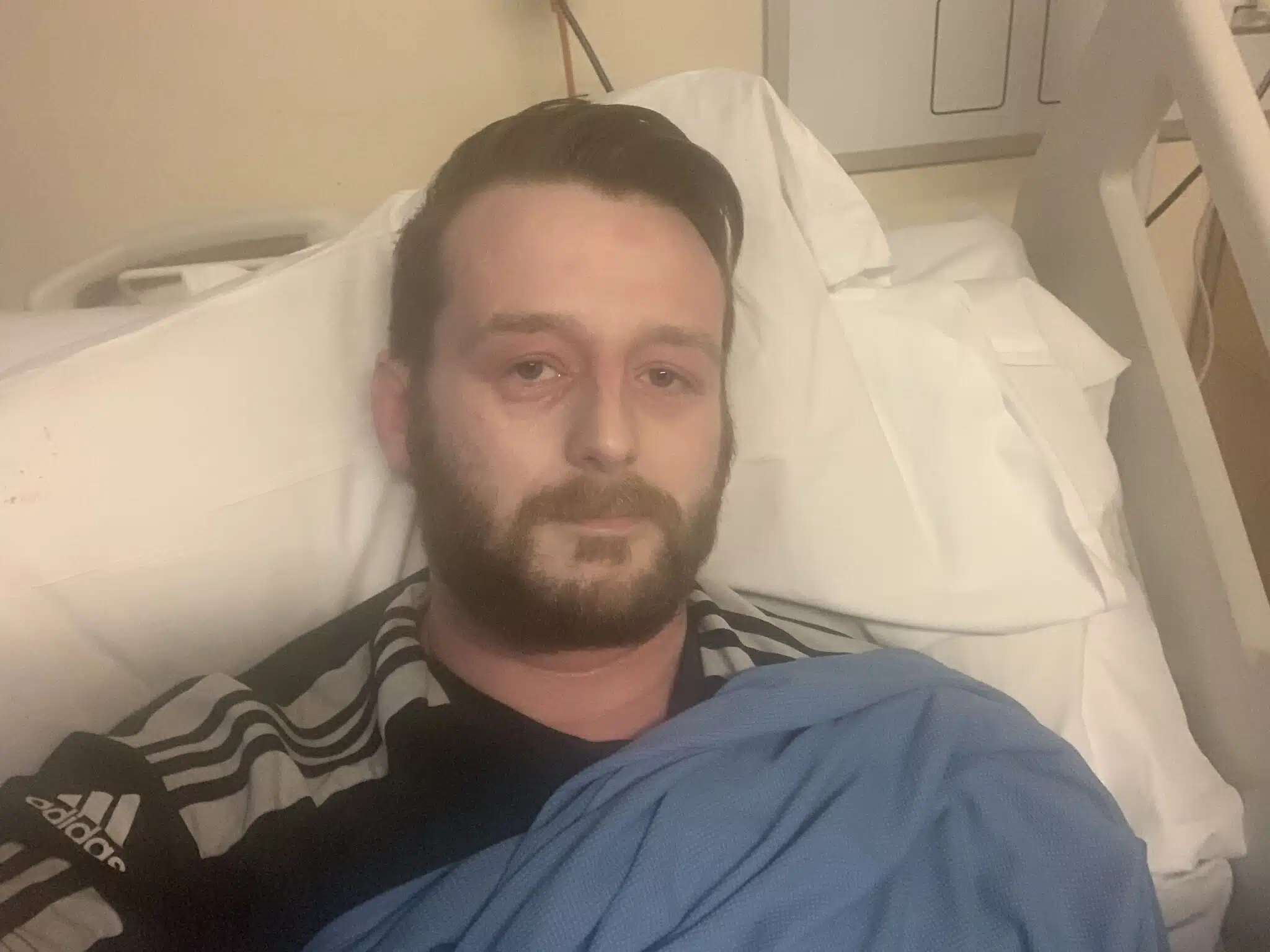
From what you wear, to the activities you can and can’t take part in, to the work you do and even having children. If you live with more severe atopic eczema, you have to constantly plan and prepare. Along with a time-intensive and messy skincare regime, and regularly disturbed sleep, life with eczema can be all-consuming for people with eczema often their families. Eczema is also a visible skin condition, and many people worry how others will react when their skin is inflamed.
That is why Vinne is making a stand, as he steps into the ring, “I’ll be raising awareness and funds to support others facing the same fight. As a wrestler, managing eczema adds an extra layer of challenge. The pressures of performing and training while dealing with a long-term skin condition isn’t often talked about, but are very real,” said Vinnie.
“I’ve had eczema since my teenage years. It’s been a part of my life, but recently it escalated to the point where I was hospitalised for two nights due to a severe flare-up”.

“This event is more than a wrestling show, it’s a platform to raise awareness and let everyone know that with the right support, no one has to face eczema alone”, explains Vinnie.
National Eczema Society works to make life better for the eczema community , by providing information, supporting research and campaigning for better care. This year, the charity is celebrating its 50th anniversary.
“It’s amazing to see Vinnie Kray so committed to raising awareness and funds for the Society’s vital work”, said Andrew Proctor, chief executive of National Eczema Society.
“There is no cure for eczema, and until then we will work tirelessly to support our community and progress research to find the answers we so desperately need”.
If you can, grab a ticket and join the action live in Stevenage.
On Sunday 27th April, an incredible team of seven National Eczema Society supporters, competed in the 2025 TCS London Marathon.
A massive thank you to Richard, Hannah, Tatum, Jessica, Rebecca, Poppy, and Harry, who took on the 26.2-mile challenge to raise awareness of eczema.
Thanks to their amazing efforts, they all smashed their individual fundraising targets and raised over £17,162 for National Eczema Society, and we are so grateful for their support!

They trained, pushed through every mile, and made every step count. It has truly been inspiring.
And shout out to every runner, volunteer, and supporter at the London Marathon.
If you would like to lace up your running trainers to take on a challenge for National Eczema Society, explore our events today.
Thank you, BBC, for featuring the huge problems people with eczema face waiting for a dermatologist appointment.
Many people struggle for a long time trying to control their eczema with the help of their GP and are very unwell by the time they get a referral to dermatology.
The pressure of then having to wait months or years to see a dermatologist is intolerable. It’s not right people with complex skin conditions like eczema are sent to the back of the queue. Eczema profoundly affects people’s physical health, mental health, quality of life and even life chances.
Read the full story: BBC News, Living hell for ‘forgotten’ skin patients.
‘We don’t understand why people with eczema and other inflammatory skin conditions are being treated as second-class citizens by the NHS. Eczema profoundly affects people’s physical health, mental health, quality of life and even life chances. It’s vital eczema patients are treated quickly and effectively by Dermatology service when they their symptoms are severe and they are very unwell.’ said Andrew Proctor, chief executive of National Eczema Society.
It’s vital eczema patients are treated quickly and effectively by Dermatology services when they have severe symptoms and are unwell.
A massive thank you to National Eczema Society’s eczema warrior, Elle, who bravely shared her experience as part of the feature. It is important that we keep raising awareness.
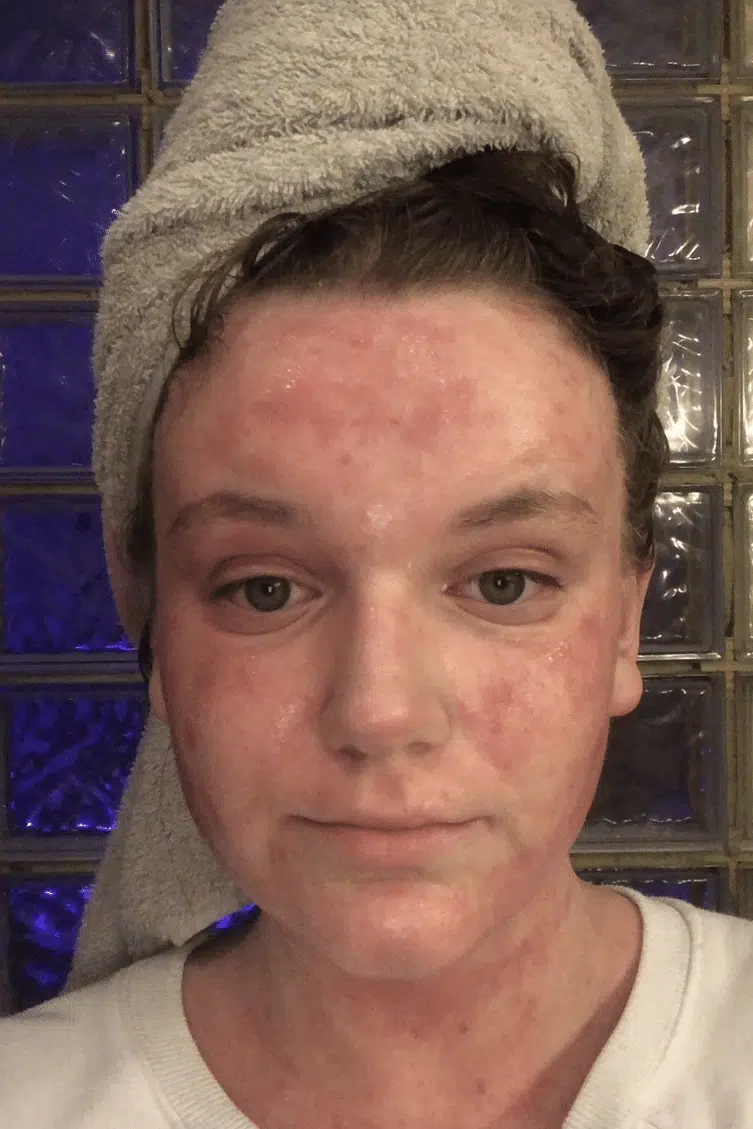
Read Elle’s eczema story today
“I waited two years to have patch testing done”.
New research from National Eczema Society and EPIMAX®, surveying over 700 women across the UK, highlights the huge impact of menopause on eczema and skin health. One in four (25%) women who took part in the survey developed eczema for the first time during menopause. The majority of women, some 87%, wish they had known more about the impact of menopause on skin health before experiencing menopause themselves.
In England and Wales, women make up 51% of the population, and at some stage in their lives they will go through menopause. While symptoms like hot flushes and brain fog are widely recognised, the impact of menopause on skin health remains under-researched and rarely discussed. That needs to change!
We want to shine a light on menopause and eczema. It’s time to start the conversation.
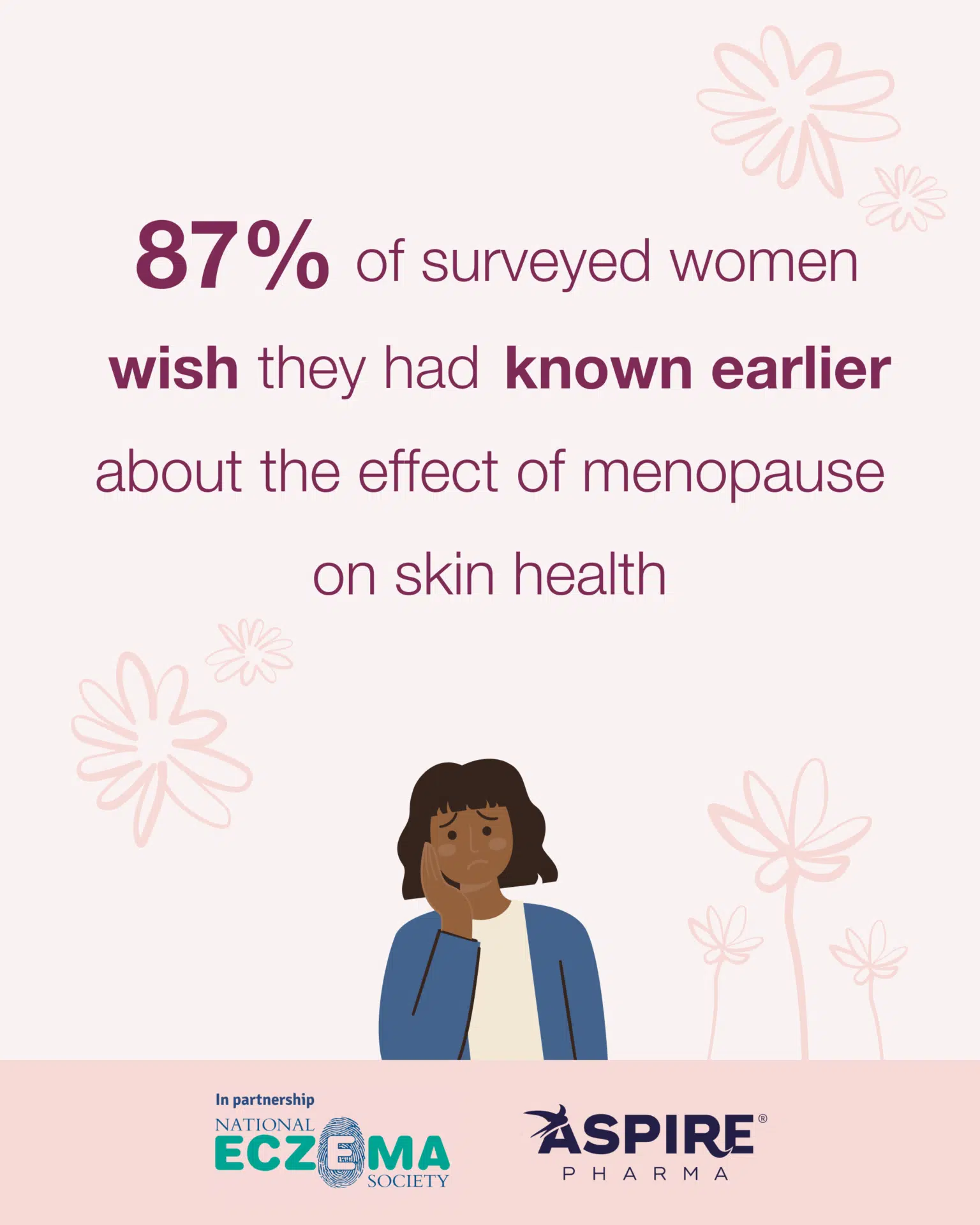
How does menopause affect the skin?
During menopause, oestrogen levels decline, leading to changes in the skin that can make it more prone to dryness, irritation and eczema. Despite this, the connection between menopause and eczema remains largely unrecognised, even though it significantly affects many women’s daily lives.
I think we need more research into the affects of the menopause on eczema and skin health, and more support made available to women who are suffering with this, along with everything else that menopause brings – read Kathryn’s story
Impact on daily life
In the survey, 85% of women with eczema or dry skin said the menopause impacted their lives, affecting their confidence, relationships, hobbies, and social lives. Many women reported feeling self-conscious (73% of respondents), stressed (47%), sad (43%) and fatigued (34%).
Despite this, 90% of women said there is not enough information available about managing eczema or dry skin during menopause. This is especially important for those women experiencing eczema for the first time during and after menopause.
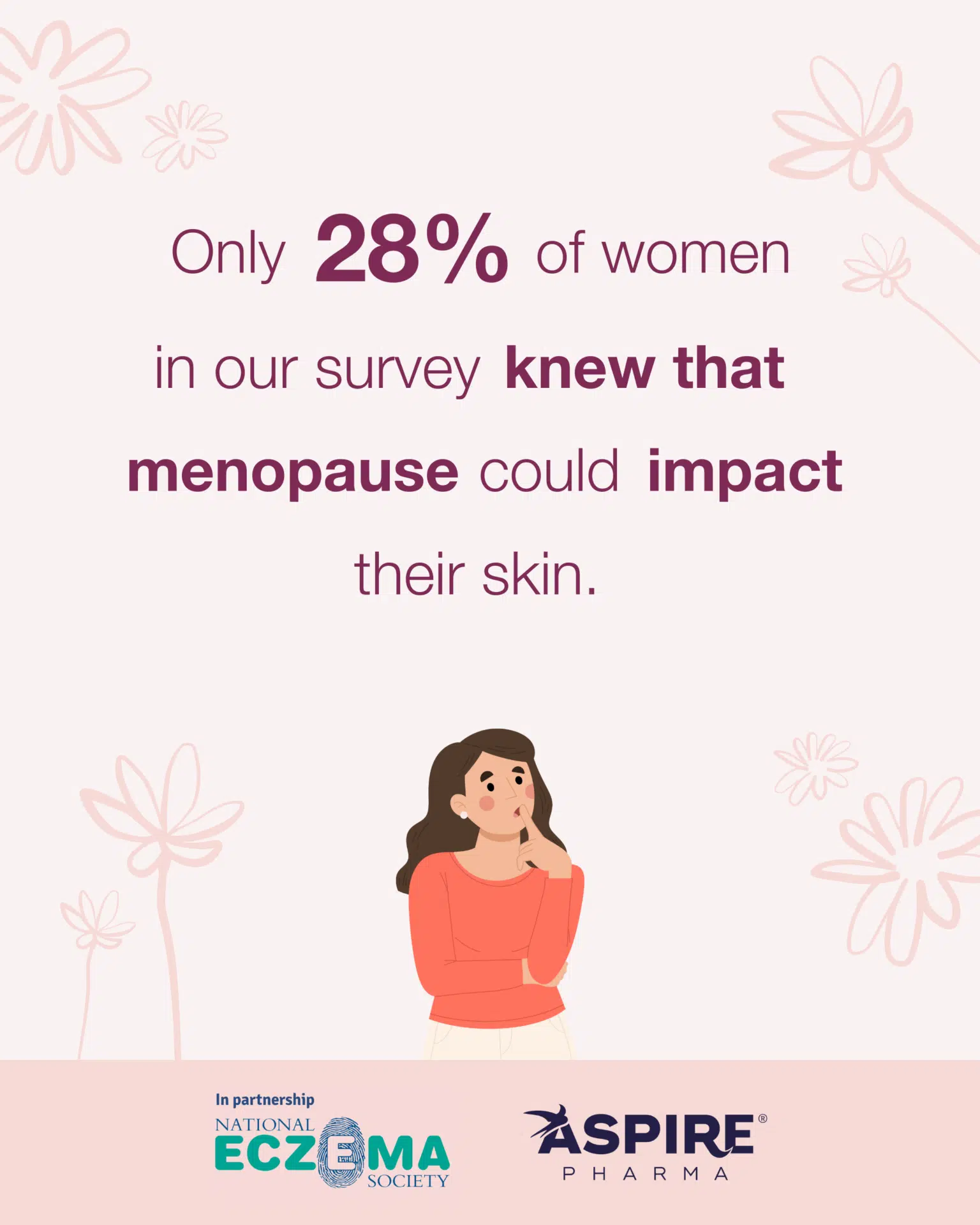
More awareness and research needed
These findings highlight the urgent need for further research to better understand the connection between menopause and eczema. At National Eczema Society, we’re proud to have started this important conversation and raise awareness, but there’s still much more to do.
We’re grateful to the 710 women who took part in the eczema and menopause survey, and to EPIMAX® for collaborating with us to raise awareness of the impact of menopause on eczema and skin health. The more we talk about it, the greater the impact we can make.
Find out more about menopause and eczema.
Data from a survey of 710 respondents who are experiencing menopause and suffering with eczema or dry skin conducted by EPIMAX® and National Eczema Society in October 2024 ©.
Brilliant to share the experiences and challenges of our eczema community at the atopic eczema masterclass event for dermatology nurses yesterday (24 March 2025) in Birmingham.
Thank you to the British Dermatological Nursing Group for inviting us to take part and listening to patients! Huge thanks to Kym Dawson for sharing her inspirational eczema journey.
It was fabulous as well to hear about all the progress being made by the dermatology nursing community to improve patient care.
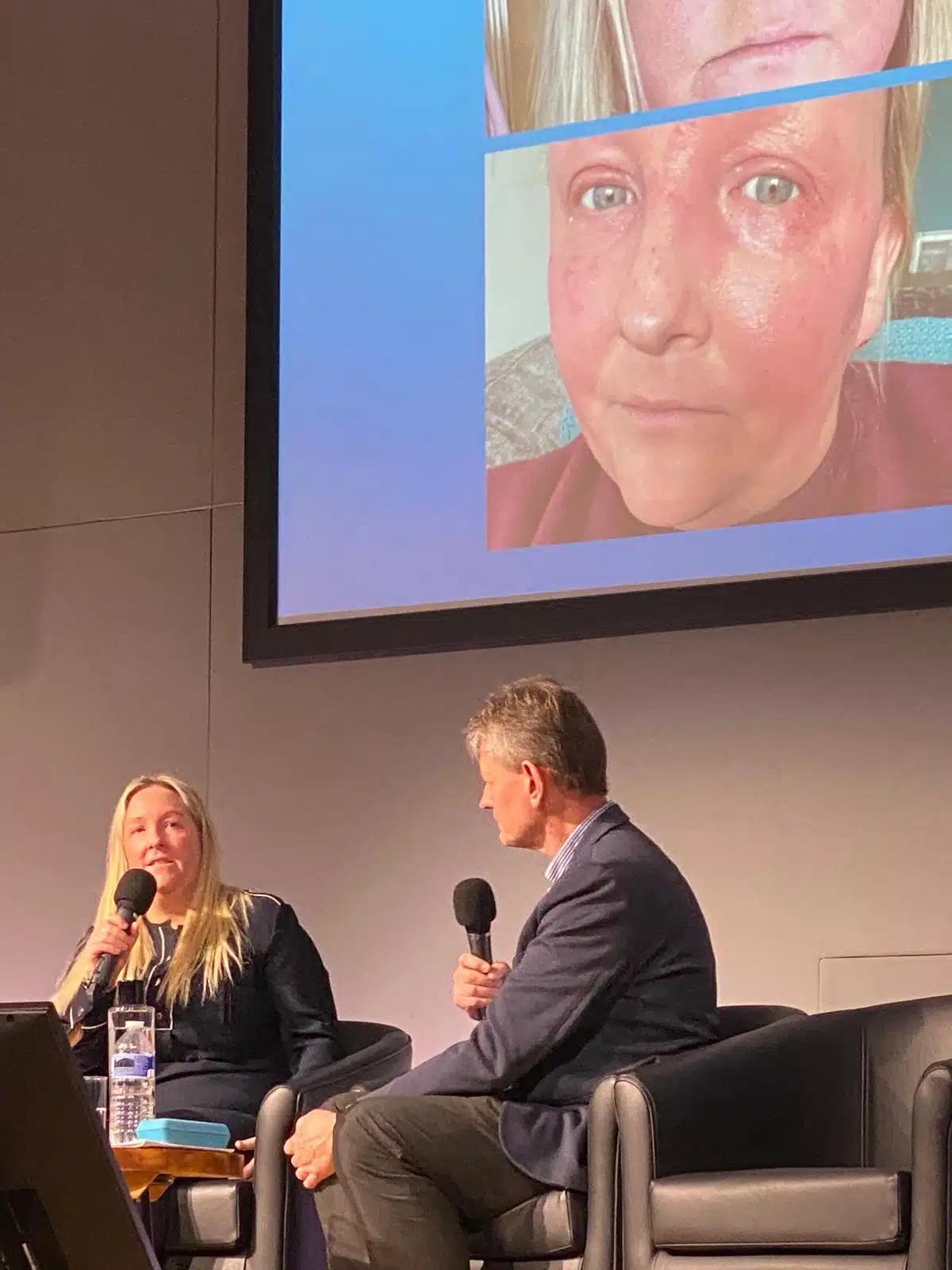
Our Chief Executive, Andrew Proctor talked about the priorities for National Eczema Society going forward, including campaigning for NICE quality guidelines for atopic eczema for adults and fair access to emollients on NHS prescription.
National Eczema Society Trustee, Professor Celia Moss also spoke at the event, explaining what we know about topical steroid withdrawal (TSW) and the urgent need for more research.
